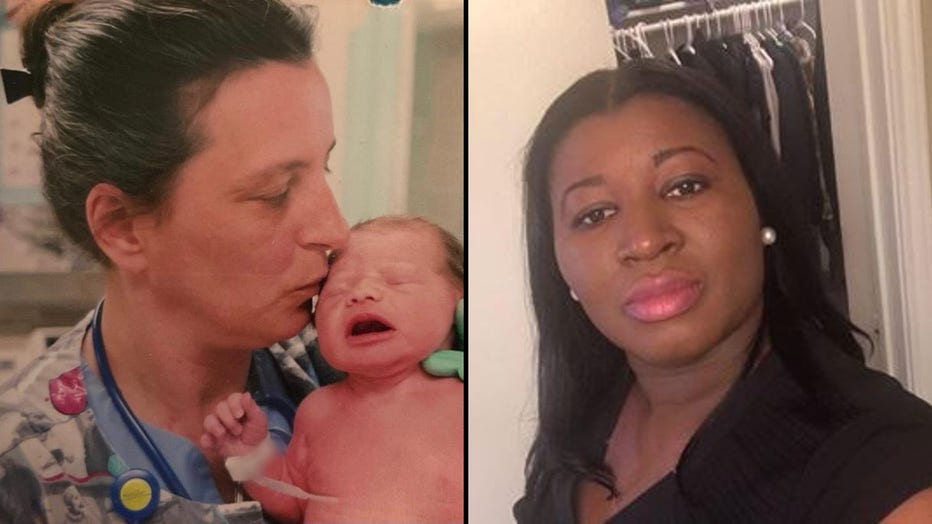Dallas Methodist Hospital shooting: What has changed one year later
Officer's response to Dallas Methodist hospital shooting was 'superb,' police expert says
Police released the body camera video on Wednesday of the officer at the center of the harrowing events inside Methodist Dallas Medical Center.
DALLAS - Sunday marks one year since the shooting at Dallas Methodist Hospital that killed a nurse and healthcare worker in the hospital's labor and delivery area.
On Oct. 22, 2022, the shooter, Nestor Hernandez, was allowed to see his newborn and ended up assaulting his girlfriend and killing healthcare workers Jackie Pokuaa and Katie Flowers.

While in the room with his girlfriend and newborn child, Hernandez began to act strangely and accused his girlfriend of cheating on him, according to an arrest affidavit.
45-year-old social worker Jacqueline Pokuaa came in to provide services for Hernandez's girlfriend, he stood up and shot her, according to the affidavit.
Nurse Katie "Annette" Flowers then looked into the room and was shot in the hallway, the documents say.
Methodist Hospital Police Sgt. Robert Rangel shot Hernandez in the right leg and he was taken into custody.
Dallas Methodist hospital shooting captured on surveillance, body camera
Dallas police released surveillance and body camera video of the shooting at Methodist Dallas Medical Center on Oct. 22 that killed two healthcare workers.
Hernandez was out on parole from state prison for an aggravated robbery he committed in 2015. He was wearing an electronic ankle monitor. The Texas Department of Criminal Justice granted him permission to be with his girlfriend for their baby's delivery.
A letter from the TDCJ and the Texas Board of Pardons and Paroles said Hernandez had six different ankle monitor violations before he allegedly killed Pokuaa and Flowers.

Nestor Hernandez (Source: Dallas Jail)
On June 17, 2022 Hernandez was arrested for tampering with the strap to his ankle monitor.
He spent 100 days in jail for the violation and was released on Sept. 28, 2022, just weeks before the shooting.
Hernandez is charged with the capital murder of multiple persons in connection to the hospital shooting.
The trial is scheduled to begin on Nov. 6 at 9 a.m.
Changes to the Law
Bills toughen penalties for people who tamper with ankle monitors
After the tragic Methodist shooting in November, lawmakers agreed there needed to be tougher penalties on parolees who tamper with their ankle monitors.
In response to the shooting, Texas lawmakers passed a bill enhancing the criminal penalties for people who assault hospital staff members.
Senate Bill 840, also known as the "Jackie Pokuaa and Annette Flowers Act," upgrades the charge for the crime from a misdemeanor to a felony.
Another bill signed in response to the shooting is Senate Bill 1004. It criminalizes cutting off ankle monitors.
"This goal is to deter and hold accountable parolees on ankle monitors as a condition of their release," Gov. Abbott said when he signed the bill.
At the time of the shooting, removing or disabling an ankle monitor was only an administrative penalty. Now, it’s a state jail felony.
Both bills went into effect on Sept. 1, 2023.
PREVIOUS COVERAGE:
- Bill passed in response to 2022 Dallas hospital shooting heads to governor's desk
- Bills toughening penalties for parolees who tamper with ankle monitors signed into law
- Dallas hospital shooting suspect accused girlfriend of cheating before killing 2 workers, affidavit says
- Officer gets standing ovation at Texas Capitol for response to Dallas Methodist hospital shooting
- 2 hospital employees killed in shooting at Methodist Hospital in Dallas, suspect in custody
- 'Failure of our criminal justice system': Suspect charged with murdering 2 nurses at Dallas hospital has a long criminal history
- Methodist Dallas increasing security at hospital after shooting kills two healthcare workers
- Healthcare workers raise concerns about safety after shooting kills 2 nurses at Dallas hospital
- Two healthcare workers killed in Dallas hospital shooting identified

